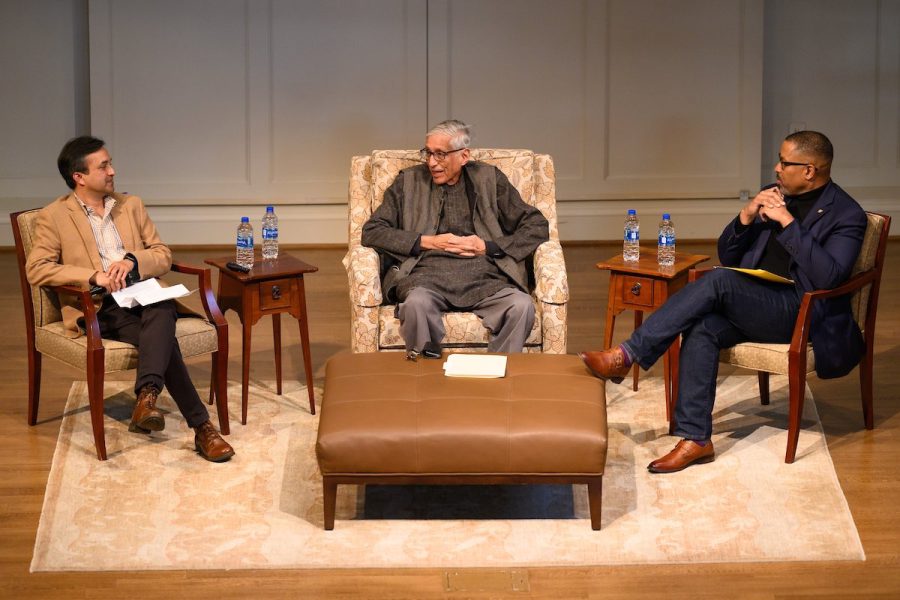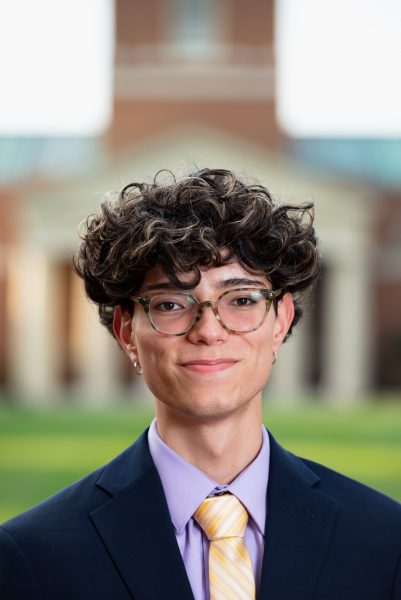Rajmohan Gandhi, grandson of Mahatma Gandhi, calls students to action
The retired professor discusses his grandfather’s legacy, as well as that of Martin Luther King
Rajmohan Ghandi (center) speaks with history department chair Dr. Raisur Rahman (left) and African American Studies program director Dr. Corey D.B. Walker (right).
March 20, 2023
rightAlthough they never met, activists Mahatma Gandhi and Martin Luther King, Jr. share a legacy of nonviolent resistance. Professor Rajmohan Gandhi — the paternal grandson of Mahatma Gandhi — visited Wake Forest last week to challenge students to incite change in their communities.
“We need to learn from Gandhi and King, but we also need to find our own energies, solidarities and ways to confront the supremacy doctrine we are now facing,” Rajmohan Gandhi said in a March 13 event.
That event, “Gandhi, King and the Future of Humanity” was moderated by Director of African American Studies, Interim Dean of Divinity and Wake Forest Professor of the Humanities Dr. Corey D. B. Walker and Interim Chair of the History Department Dr. Raisur Rahman. Walker explained the value of conversations like the one he and Rahman had with Rajmohan Gandhi.
“Conversations are truly risk-filled endeavors,” Walker noted at the beginning of the event. “They invite you into an opportunity to be transformed.”
Rajmohan Gandhi is known for his work as a scholar, public intellectual, political figure and peace activist. He is president of the non-profit Initiatives of Change International — a global community committed to transforming society through changes in human motives and behaviors.
The activist — who, unlike his grandfather, met King early in his career — opened the conversation by citing King’s Palm Sunday sermon on Mahatma Gandhi. The sermon laid the framework for much of the conversation.
“If humanity is to progress, [Mahatma] Gandhi is inescapable,” King said in his sermon. “He lived, thought and acted, inspired by the vision of humanity evolving toward a world of peace and harmony. We may ignore him at our own risk.”
Rajmohan Gandhi later recalled stories of his grandfather traveling to Johannesburg, South Africa, where he spent 21 years of his life. While in South Africa, Mahatma Gandhi worked with local liberation movements and incited solidarity among community members. Upon his return to India, Mahatma Gandhi helped lead the Indian independence movement and continued to advocate for freedom.
“In 1917, two years after [Mahatma] Gandhi returned to India from South Africa, he began his fight to stand up against the British Empire. Gandhi did this through forging a Hindu-Muslim alliance for India’s freedom from colonial rule,” Rajmohan Gandhi said.
Rajmohan Gandhi concluded his message by urging attendees to be inspired by King and Mahatma Gandhi’s legacies and take action against oppression.
“The young people here should consider that we have to do something,” Rajmohan Gandhi said. “We need a multi-faith and multi-race effort to fight oppression everywhere in the world.”
He continued: “People may have a plan B, but there is no planet B. Until the end of the last century, the world did not practice democracy or equality. The world paid lip service to equality and democracy. But today, the world pays lip service to supremacy. Now is the time to act.”
Senior Ashley Davis connected Rajmohan Gandhi’s message to Wake Forest’s motto Pro Humanitate. The conversation between Rajmohan Gandhi, Walker and Rahman reminded her of the importance of action.
“This discussion about the future of humanity was a good reminder of what Pro Humanitate means,” Davis said. “Being for humanity requires us to put in the work, to stand up for what is right and to continue the fight that King and [Mahatma] Gandhi were a part of.”
Walker echoed Davis and emphasized how, when put to action, a single idea can transform society.
“[Mahatma] Gandhi and King are true exemplars of our university’s motto Pro Humanitate,” Walker stated after the event. “They demonstrate how the power of an idea can transform lives and societies. The lessons of their lives and legacies can and should empower our educational aspirations well into the 21st century.”
Correction March 21, 2023: An earlier version of this article misstated the position of Dr. Raisur Rahman in the featured image. He is on the left, and Dr. Corey D.B. Walker is on the right.















